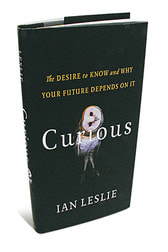 Curiosity. We see it brimming over in young children. Then it slowly wains. By the time these children reach the college classroom it has gone extinct in many of them. Sadly, the very thing that is supposed to be supporting our curiosity is a large factor in its decline: schooling. The focus on answers over questions drives out curiosity in favor of certainty. The fear of being wrong drives out curiosity in favor of certainty. The ubiquity of information drives out curiosity in favor of trivia. Ian Leslie's book does a good job of addressing not only the importance of curiosity but also why it declines and how to preserve it. As he points out "curiosity is vulnerable to benign neglect." It needs to be cultivated and supported. It is a habit that needs to be fostered by continued practice. Often we don't get that practice. Leslie relates several compelling stories related to the need for curiosity. The first one comes from business professor Robert Mittelstaedt in his book Will Your Next Mistake be Fatal? "Titanic received many incoming messages warning of ice, but there is no mention of her inquiring of others for updates or more information. What if someone was curious enough to ask for more information from the ships in the area?" As Leslie then points out, "afterward, several planners and shipbuilders involved admitted to having had questions about the ship's safety that they didn't raise in front of colleagues, for fear of appearing foolish."
Ahh, the fear of appearing foolish. Perhaps one of the biggest curiosity killers among students and even well-experienced professionals. It is no wonder that Leslie discusses this as the first point of seven ways to preserve curiosity: stay foolish. Consider Socrates. He was told that he was the wisest of all men in Athens because he was aware of what he didn't know. He was not afraid to ask foolish questions. Very often these "foolish" questions revealed profound insights. Speaking of knowing what he didn't know this relates to a second story Leslie tells about curiosity: the often ridiculed statement of Donald Rumsfeld where he said "There are known knowns; there are things we know we know. We also know there are known unknowns; that is to say, we know there are some things we don't know. But there are also unknown unknowns-the ones we don't know we don't know." While initially ridiculed the statement was later reevaluated and was recognized by linguist Geoffrey Pullum as "impeccable, syntactically, semantically, logically, and rhetorically." One reason this is such a useful insight is that, as Leslie points out, "to feel curious, you have to be aware of a gap in your knowledge in the first place. The trouble is, most of us, most of the time, go around thinking we know everything." One of Leslie's last pieces of advice for preserving curiosity is to turn puzzles into mysteries. This is based on a distinction between the two that is discussed earlier in the book. "Puzzles have definite answers." On the other hand, "mysteries are murkier, less neat." They contain an uncertainty that puzzles do not. Puzzles focus on tactical questions such as "How many?" or "Where?" Mysteries force us to contemplate bigger "How?" or "Why?" questions. So, ask more questions. Don't be afraid to seem foolish. Cultivate an enjoyment of learning and an appreciation of the mundane. Anything can be a source of curiosity. But, you have to be willing to open yourself to the opportunity when it presents itself. As Pasteur once said, "chance favors the prepared observer." Part of being prepared is to be curious. Comments are closed.
|
KEVIN J. BROWNEPhilosopher / Educator These blog posts contain links to products on Amazon.com. As an Amazon Associate I earn from qualifying purchases.
Categories
All
Archives
April 2023
|



 RSS Feed
RSS Feed
















